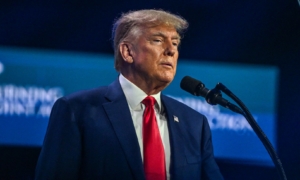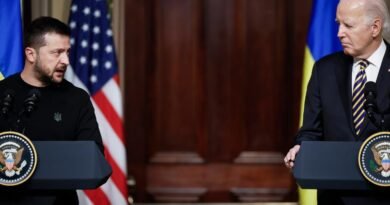Seditious Conspiracy Likely Charge if Trump January 6 Grand Jury Investigation Reaches Indictment

News Analysis
Upon President Donald Trump’s revealing a grand jury is investigating him in relation to the Jan. 6, 2021, U.S. Capitol protest and riot, seditious conspiracy emerges as the likely charge he will face.
Mr. Trump said he was informed of being the target on Sunday night through a letter from the office of Jack Smith, a special counsel appointed by Attorney General Merrick Garland to investigate Mr. Trump’s involvement in the January 6 incident as well as his retention of documents from his time in the White House.
“This witch hunt is all about election interference and a complete and total political weaponization of law enforcement!” Mr. Trump commented in a July 18 post on Truth Social, his social media platform.
He said he was given four days to show up before the grand jury, but it’s not clear whether he is being subpoenaed to testify or invited to testify voluntarily.
‘Tactical Move’
Prosecutors should first ask for a voluntary appearance before subpoenaing the target of a criminal investigation, according to the Department of Justice’s (DOJ) Justice Manual.
Also, lawyers usually discourage their clients from going before a grand jury if they are the target of the investigation—it can be avoided by pleading the Fifth Amendment right against self-incrimination, explained Marc Ruskin, former FBI agent and assistant U.S. attorney.
However, this may be Mr. Smith’s goal, according to Mr. Ruskin.
He noted that Mr. Trump is already facing indictments in New York and Florida and pleading the Fifth in Washington gives another talking point to his opponents.
“It could be a tactical and procedural move just to make him look bad,” he said.
“You have Trump, a former president who is running to be president again, pleading the Fifth. I guess from their point of view, it’s going to help make him less attractive as a candidate.”
If the target is not asked to testify, “the prosecutor, in appropriate cases, is encouraged to notify such person a reasonable time before seeking an indictment in order to afford him or her an opportunity to testify before the grand jury,” the manual says.
Mr. Trump indicated he believes charges against himself are imminent, saying that being told to report to the grand jury, “almost always means an Arrest and Indictment.”
Some commentators have long predicted Mr. Trump will face charges in the probe, including Julie Kelly, an independent journalist who’s been closely following the trials of January 6 participants.
“I’ve warned of this for over a year. I take no pride in being right,” she commented in a July 18 tweet.
“Only question now is what charges Smith will bring (strong possibility he’ll seek indictment on seditious conspiracy) and who is charged with him. (Any conspiracy charge requires at least one conspirator).”
Back in April, she highlighted several members of the pro-Trump Proud Boys group that were convicted of seditious conspiracy. In her view, the DOJ had approached the Proud Boys trial in a way that seemed to lay groundwork for levelling the same charge against Mr. Trump.
During the closing arguments, it seemed to her prosecutors tried to tie Proud Boys to Mr. Trump, particularly regarding a comment by Mr. Trump during a 2020 presidential debate that Proud Boys should “stand down and stand by.”
She pointed to a comment by one of the prosecutors that “defendants saw themselves as Donald Trump’s army, fighting to keep their preferred leader in power no matter what.”
“Convictions of 4 members of the Proud Boys set the stage for Smith to pursue a seditious conspiracy indictment against Trump because DOJ made the former president an unindicted co-conspirator of sorts during the trial,” Ms. Kelly told The Epoch Times via text.
Stretchable Statute
Seditious conspiracy is a broad statute that includes not just attempts to forcibly overthrow the government, but also much less consequential behavior, such as any agreement “by force to prevent, hinder, or delay the execution of any law of the United States.”
“The allegation would be that Trump conspired with others, including perhaps those already convicted, to ‘by force’ either hinder, delay, or prevent the certification of the Electoral College vote,” Ms. Kelly opined.
“Astonishingly, that’s the vague burden of proof in several seditious conspiracy cases.”
Mr. Smith may not argue that Mr. Trump actually conspired with the Proud Boys, but rather that his comment to “stand down and stand by” was a part of the conspiracy.
The co-conspirators could be people from Mr. Trump’s orbit.
“Prepare for lawyers, WH officials, campaign aides, and maybe GOP House members to be indicted, too,” Ms. Kelly said in a tweet.
General conspiracy charges don’t require any nefarious act to actually be committed. It suffices if two people agree to commit the crime and conduct an “overt act” to carry out the agreement. Such acts could be innocuous by themselves. If two people agree, for example, to kidnap somebody and one of them then buys a pack of zip ties, the government could argue zip ties were to be used to tie the hands of the victim and substantiate the charge, even if the plot never progressed.
The Proud Boys trial demonstrated how far the law can by stretched, Ms. Kelly suggested.
“Individuals who brought no weapons and committed no violence nonetheless have been convicted of seditious conspiracy despite a dearth of evidence—nothing more than texts and plan to travel to Washington, D.C.,” she said.
The conspiratorial agreement doesn’t need to be explicit. A nod would suffice, prosecutors have argued, according to Ms. Kelly.
Moreover, if general conspiracy cases are any indication, the government only needs circumstantial evidence of such an agreement.
Circumstantial Case Study
In the trial of Bijan Rafiekian, former business partner of retired Lt. Gen. Michael Flynn, prosecutors told the jury that Mr. Rafiekian conspired to act as an unregistered agent of Turkey even though there was no direct evidence of such an agreement and the Flynn-Rafiekian outfit did register as a foreign lobbyist when prompted by the DOJ.
Mr. Rafiekian’s client, Turkish businessman Ekim Alptekin, claimed the project initially was supposed to be run by the Turkish government, but that it eventually dropped it and he hired Flynn’s firm for a separate, but very similar project that he ran himself on behalf of Turkish businesses.
Prosecutors argued this explanation was incredulous and that Mr. Rafiekian’s going along with it meant that he agreed to share in a conspiracy.
The “overt act” seemed a mere formality then.
“An overt act can be anything completely legal, like sending an e-mail, like the one that the defendant sent to his team saying, hey, we’ve been hired by a bunch of Turkish businessmen,” one of the prosecutors said in his rebuttal of the defense’s closing argument.
The jury convicted Mr. Rafiekian, but the judge threw away the verdict, saying the prosecutors impermissibly stretched the law.
Views expressed in this article are the opinions of the author and do not necessarily reflect the views of The Epoch Times.




